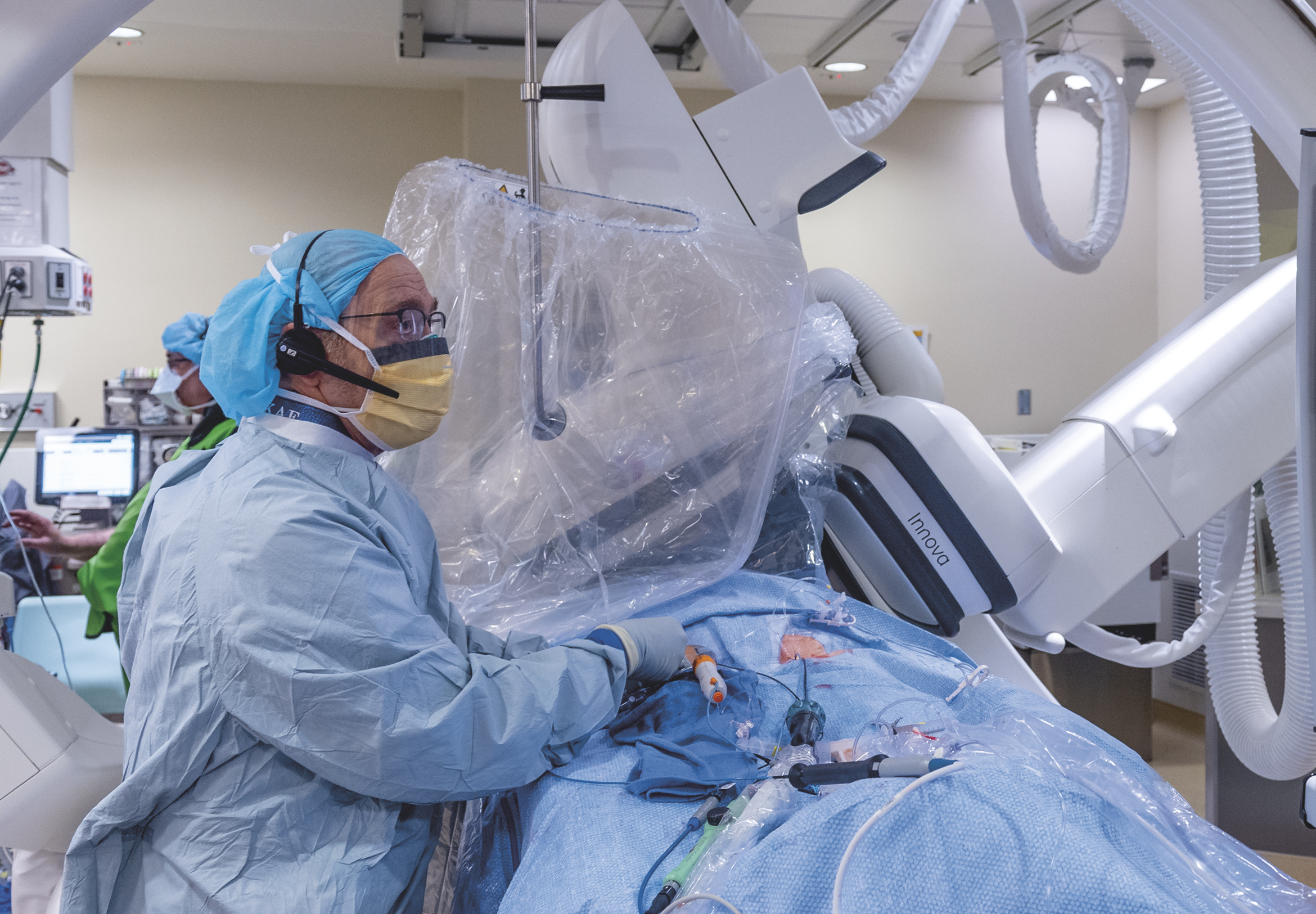WATCHMAN device: We lead the clinical trial
WATCHMAN device: We lead the clinical trial

Clinical trial could mean end of blood thinners for AFib patients
When competitive water skier John Howell developed chronic atrial fibrillation in his 70s, he started a blood thinner regimen to treat and prevent blood clots and reduce the risk of stroke. But participating in sports can be dangerous for someone taking anticoagulants, which can cause excessive bleeding. One spill from his skis and Howell could bleed uncontrollably.
“You want a nice, efficient heart when you’re exercising,” he said. “Unfortunately, when you ski, you can take some dramatic crashes that can be life-threatening.”
After four or five years on the drug Eliquis, Howell, 80, wanted his AFib cured. Twice he tried cardioversion, a procedure that can restore normal heart rhythm by applying a controlled electric shock to the heart to break the pattern of abnormal electrical signals. After each time, however, his AFib returned.
Out of options, Howell’s cardiologist in Fredericksburg, Virginia, referred him to VCU Health Department of Cardiology chair Dr. Kenneth Ellenbogen, whom they were confident could help the retired dentist. Pauley Heart Center’s Atrial Fibrillation Program offers a full spectrum of innovative therapies and treatments and is focused on meeting the individual needs of each patient. Because Howell had a high risk of stroke, Ellenbogen recommended he receive a WATCHMAN implant, which he’d been successfully using for years. The parachute-shaped device is designed to keep harmful blood clots that form in the left atrial appendage from entering the blood stream and potentially causing a stroke.
The WATCHMAN is permanently placed at the opening of the left atrial appendage. The procedure requires an overnight stay in the hospital, and recovery takes about 24 hours.
“I was all for having it done,” Howell said. “I have the highest regard for Dr. Ellenbogen and felt like I was in really good hands.”
He had the procedure done without incident. “Then, I went about my life playing tennis and water skiing,” said Howell, a multi-time Eastern regional timed slalom champion.
"This is probably one of the most important studies being done in the next five years in clinical cardiology."
Positive outcomes like Howell’s interested Ellenbogen in studying whether the newest version of the WATCHMAN device may one day be the preferred therapy for patients with non-vascular AFib who are at high risk of stroke. Ellenbogen is a co-chair of CHAMPION-AF, a global, head-to-head clinical trial of the WATCHMAN FLX device versus non-vitamin K antagonist oral anticoagulants (NOACs).
“This is a groundbreaking study that looks at a device that the doctors here have been implanting for a number of years successfully and looks at it as first-line therapy for preventing stroke in patients with atrial fibrillation,” Ellenbogen said. “That’s huge.”
What is AFib?
If your heart beats too rapidly and irregularly, you may require treatment for atrial fibrillation, the most common abnormal heart rhythm. When the upper part of your heart (the atria) beats irregularly and too fast, this can cause your heart to quiver (“fibrillate”). As a result, your most important organ can’t efficiently pump blood to the rest of the body, so the brain and other organs may not receive enough blood to operate their best.
Atrial fibrillation may occur from time to time (paroxysmal) or be constant (chronic). Though AFib is rarely painful, you may feel symptoms such as lightheadedness, shortness of breath, fatigue – or nothing at all. It also increases the risk of stroke five to seven times compared to a person without AFib. In addition, AFib may cause congestive heart failure. If treated appropriately, atrial fibrillation or flutter seldom cause serious or life-threatening problems. Without treatment, AFib can lead to serious complications and irreversible damage.
Treatment for AFib may include medical management (blood thinners), cardiac assist devices, catheter ablation procedures using advanced mapping technology and a variety of minimally invasive or surgical approaches.
Anticoagulants keep blood clots from forming in an artery, a vein or the heart, and may prevent existing clots from getting larger. They are prescribed for AFib patients because their irregular heartbeats can cause blood to collect in the heart and form a clot that can travel to the brain, cutting off the oxygen and blood supply causing a stroke. About one in five people who have a stroke have AFib. The more conventional anticoagulants are warfarin (Coumadin) and heparin. However, direct oral anticoagulants like Eliquis are a class of newer medications that have fewer drug interactions and do not require regular blood monitoring.
While for many people there is no apparent cause for AFib, it can be related to underlying conditions or risk factors, including previous heart attack, congestive heart failure, leaky valves, coronary artery disease or inflammation near the heart, high blood pressure or diabetes.
WATCHMAN vs. NOAC
The CHAMPION-AF clinical trial compares NOACs like Eliquis with the WATCHMAN FLX, putting the best available drugs up against the best available left atrial appendage closure device.
 Dr. Kenneth Ellenbogen prepares for the CHAMPION-AF clinical trial.
Dr. Kenneth Ellenbogen prepares for the CHAMPION-AF clinical trial.
We’re studying different strategies for preventing stroke in patients with atrial fibrillation. And of course, the strategy most commonly used has been drug strategy,” Ellenbogen explains. “Blood thinners are great, but they make it harder for you to stop bleeding when you start bleeding. So, in patients who have atrial fibrillation, most of their strokes come from what we call the left atrial appendage, which some surgeons call the appendix of the heart. Somebody came up with the idea of if we could close off the left atrial appendage, we might be able to prevent strokes for patients with atrial fibrillation. And they wouldn’t have to take blood thinners."
In a number of pivotal studies, Ellenbogen said, it was found that patients who can’t take blood thinners but who received the WATCHMAN did well with an aspirin a day, or nothing.
The WATCHMAN device has now gone through several iterations, and the implantation procedure has been improved. “Maybe this type of device might be better than drugs for most people,” Ellenbogen said. “That’s the question our study is attempting to answer.”
About the device
The CHAMPION-AF trial will use the next-generation, FDA-approved WATCHMAN FLX device. Manufactured by Boston Scientific, WATCHMAN FLX is built on the WATCHMAN, the most studied and most implanted left atrial appendage closure device. More than 100,000 have been implanted worldwide, Ellenbogen said.
The trial includes about 150 sites globally and will enroll approximately 3,000 patients. Dr. Marty Leon, director of the Center for Interventional Vascular Therapy at New York Presbyterian/Columbia University Irving Medical Center, is a co-chair. Principal co-investigators are Dr. Shephal Doshi, cardiac electrophysiologist at Pacific Heart Institute, and Dr. Saibal Kar, interventional cardiologist at Los Robles Health System.
To be enrolled in the study, patients have to have at least a moderate risk of stroke from AFib.
“We have a lot of patients who come to see us who don’t want to take blood thinners because they’re active, or they’ve had some bleeding,” Ellenbogen said. “This study gives them the opportunity to get a device implanted without having to have had a bleeding episode to get the device implanted. So, if you’re 70 years old and you have high blood pressure, you’re going to be on blood thinners the next 20 years of your life. But if you participate in this study, you have a 50% chance of having a device implanted. So, we can see which is better, the medicine or the drugs.”
After receiving the device, patients will be evaluated in three years. “We’ll be looking to see if this device is safe and effective compared to the drug,” Ellenbogen said.
The big picture
“This is probably one of the most important studies being done in the next five years in clinical cardiology,” he added. “And Pauley is going be involved. I’m going to be involved as one of the two people who is going to steer the study to its conclusion. Whether it’s positive or negative, it’s going to possibly change the way we practice, possibly just reinforce the way we practice.”
That change could mean that any patient with AFib gets a WATCHMAN device implanted to prevent a stroke. The implant would be in place of drug therapy.
Perfect for active people like Howell, who have years of full lives ahead of them — trips to take, grandkids to raise and slalom course races yet to win.
Learn more about our Atrial Fibrillation Program:
/pauley-heart-center/our-expertise/atrial-fibrillation-program
Back to Autumn-2020

